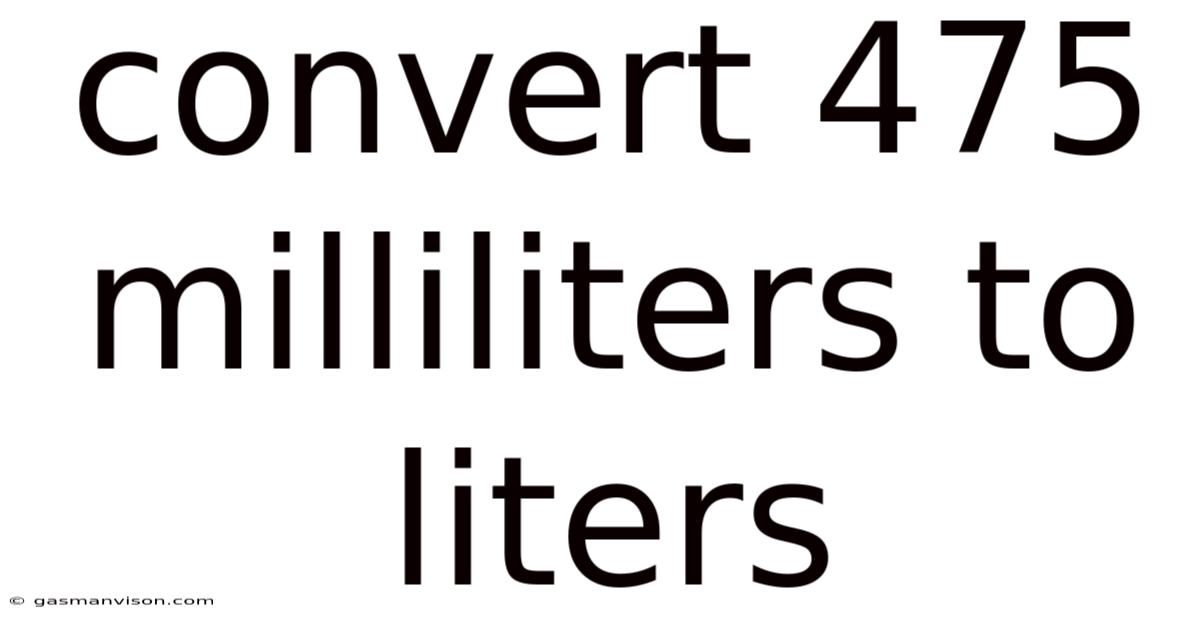Convert 475 Milliliters To Liters
gasmanvison
Sep 12, 2025 · 4 min read

Table of Contents
Converting 475 Milliliters to Liters: A Comprehensive Guide
This article will comprehensively guide you through converting 475 milliliters (ml) to liters (L), explaining the process, providing context, and exploring related volume conversions. Understanding this basic metric conversion is crucial in various fields, from cooking and baking to scientific experiments and engineering. We'll delve into the underlying principles, offer practical examples, and equip you with the knowledge to confidently handle similar conversions. This guide aims to be a valuable resource, helping you understand not just the answer, but also the 'why' behind the conversion.
Understanding the Metric System and Volume Units
The metric system, or International System of Units (SI), is a decimal system based on powers of 10. This makes conversions between units remarkably straightforward. When dealing with volume, the base unit is the liter (L). Other units, like milliliters (ml), are derived from the liter by multiplying or dividing by powers of 10.
A milliliter (ml) is one-thousandth of a liter (L). This relationship is expressed as:
1 L = 1000 ml
Conversely:
1 ml = 0.001 L
This fundamental relationship forms the basis for all milliliter-to-liter conversions.
Converting 475 Milliliters to Liters: The Calculation
Now, let's tackle the conversion of 475 ml to liters. Given the relationship above, we can easily perform this conversion using a simple equation:
Liters = Milliliters / 1000
Substituting 475 ml into the equation:
Liters = 475 ml / 1000
Liters = 0.475 L
Therefore, 475 milliliters is equal to 0.475 liters.
Different Methods of Conversion: A Deeper Dive
While the above method is the most straightforward, understanding alternative approaches can enhance your comprehension of metric conversions.
-
Using Proportions: This method relies on setting up a proportion based on the known relationship between milliliters and liters:
1 L / 1000 ml = x L / 475 ml
Solving for x (the number of liters):
x = (1 L * 475 ml) / 1000 ml = 0.475 L
-
Using Scientific Notation: This method is particularly useful when dealing with very large or very small numbers. We can express 475 ml as 4.75 x 10² ml. Then, remembering that 1 L = 10³ ml, we can convert as follows:
(4.75 x 10² ml) / (10³ ml/L) = 4.75 x 10⁻¹ L = 0.475 L
Practical Applications of Milliliter to Liter Conversions
Understanding this conversion is essential in numerous real-world scenarios:
-
Cooking and Baking: Recipes often specify ingredient quantities in milliliters (especially for liquids like milk, oil, or water). Converting to liters can be helpful for scaling recipes up or down.
-
Medicine: Many medications are measured in milliliters, particularly liquid forms. Converting to liters might be necessary for dosage calculations or when dealing with large quantities of medication.
-
Science and Engineering: In scientific experiments and engineering applications, precise measurements are crucial. Converting between milliliters and liters is essential for accurate data recording and analysis.
-
Environmental Science: Measuring water volume in various contexts – like rainfall, water pollution studies, or analyzing water samples – often requires converting between milliliters and liters.
-
Everyday Life: From filling a water bottle to understanding the capacity of various containers, the ability to convert between milliliters and liters improves your understanding of volumes in everyday life.
Beyond Milliliters and Liters: Expanding Your Conversion Skills
The principles discussed above can be extended to other metric units of volume. For example:
-
Converting to Cubic Centimeters (cm³): 1 ml is equivalent to 1 cm³. Therefore, 475 ml is also equal to 475 cm³.
-
Converting to Kiloliters (kL): A kiloliter is 1000 liters. To convert 0.475 L to kL, you would divide by 1000: 0.475 L / 1000 L/kL = 0.000475 kL.
-
Converting to Microliters (µL): A microliter is one-millionth of a liter. To convert 0.475 L to µL, you would multiply by 1,000,000: 0.475 L * 1,000,000 µL/L = 475,000 µL.
Troubleshooting Common Conversion Mistakes
While the conversion itself is relatively simple, certain mistakes can occur:
-
Incorrect Decimal Placement: Carefully track the decimal point during division. A misplaced decimal point can lead to inaccurate results.
-
Confusing Units: Ensure you are consistently using the correct units throughout the calculation. Mixing milliliters and liters without proper conversion factors can lead to errors.
-
Using Incorrect Conversion Factors: Always double-check that you are using the correct conversion factor (1000 ml = 1 L).
Conclusion: Mastering Metric Conversions
Converting 475 milliliters to liters is a fundamental skill with far-reaching applications. By understanding the principles of the metric system and applying the appropriate conversion factors, you can accurately convert between milliliters and liters and other related volume units. This knowledge empowers you to handle various tasks, from everyday measurements to complex scientific calculations, with confidence and precision. Remember to practice regularly to reinforce your understanding and build your proficiency in metric conversions. The more you practice, the more natural and intuitive these conversions will become. This foundational understanding will serve you well in various academic, professional, and everyday contexts.
Latest Posts
Latest Posts
-
La Habitacion Limpio Y Ordenado
Sep 12, 2025
-
How Much Is 400 Grams
Sep 12, 2025
-
Convert 38 Cm To Inches
Sep 12, 2025
-
Weight Of 3 Tablespoons Butter
Sep 12, 2025
-
Synonymous Most Nearly Means Asvab
Sep 12, 2025
Related Post
Thank you for visiting our website which covers about Convert 475 Milliliters To Liters . We hope the information provided has been useful to you. Feel free to contact us if you have any questions or need further assistance. See you next time and don't miss to bookmark.